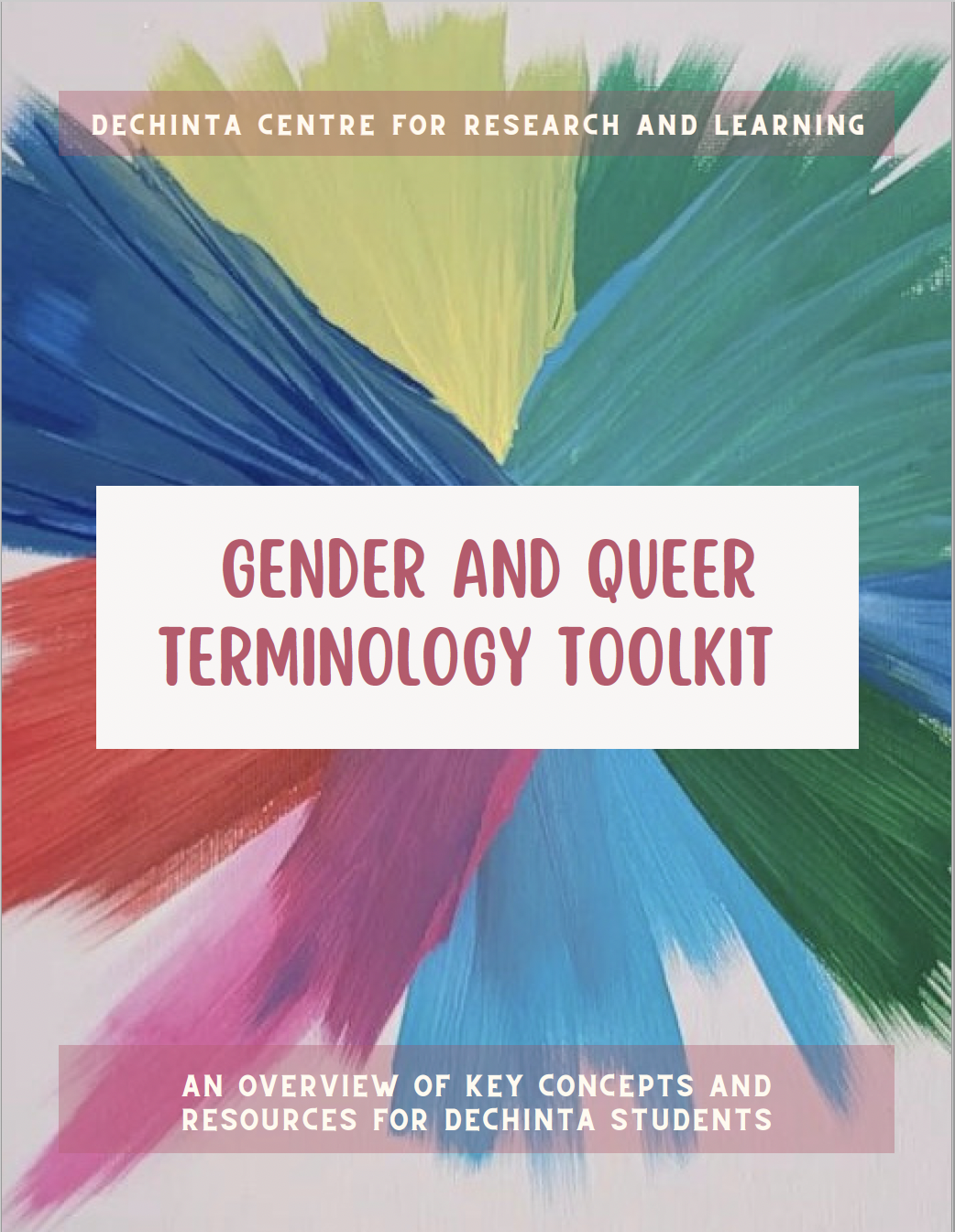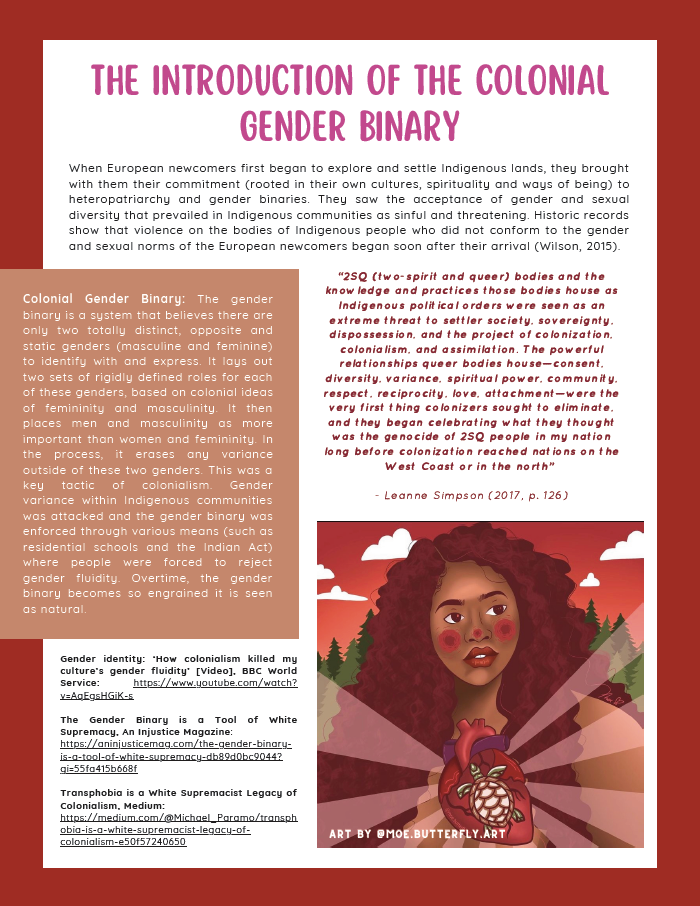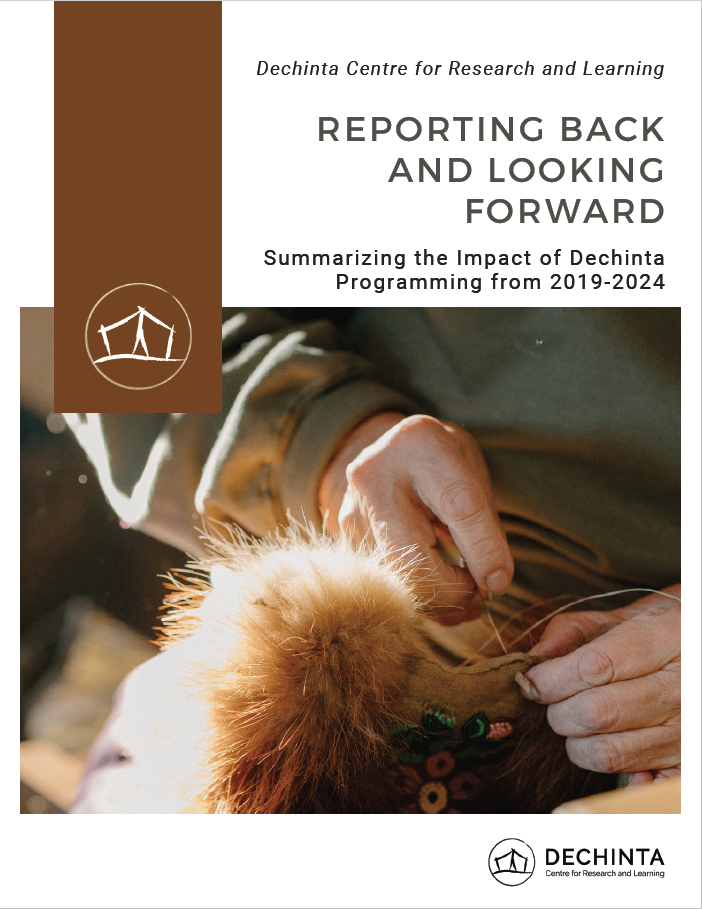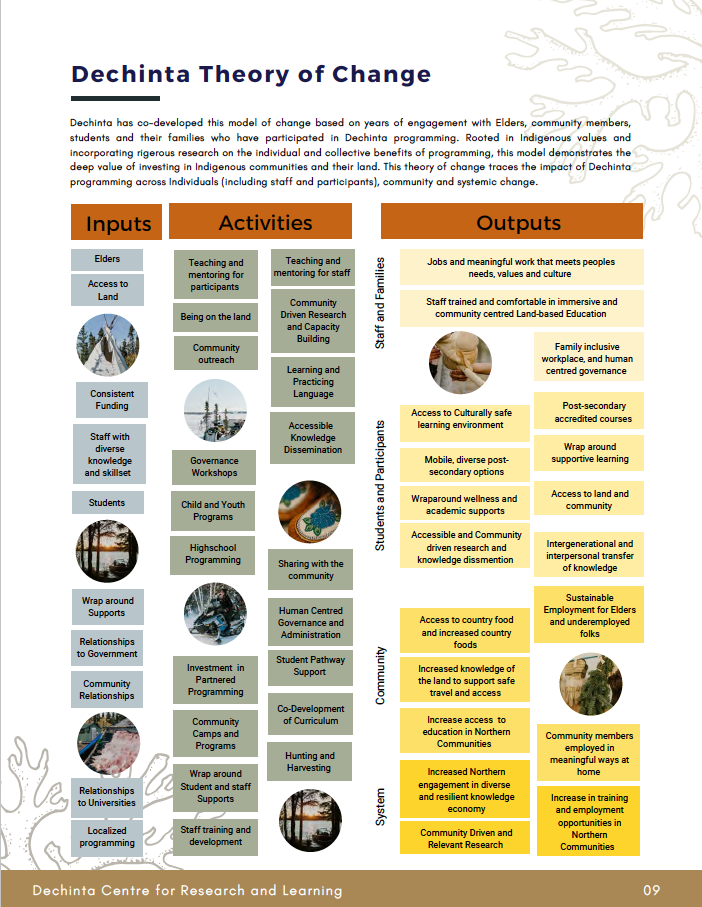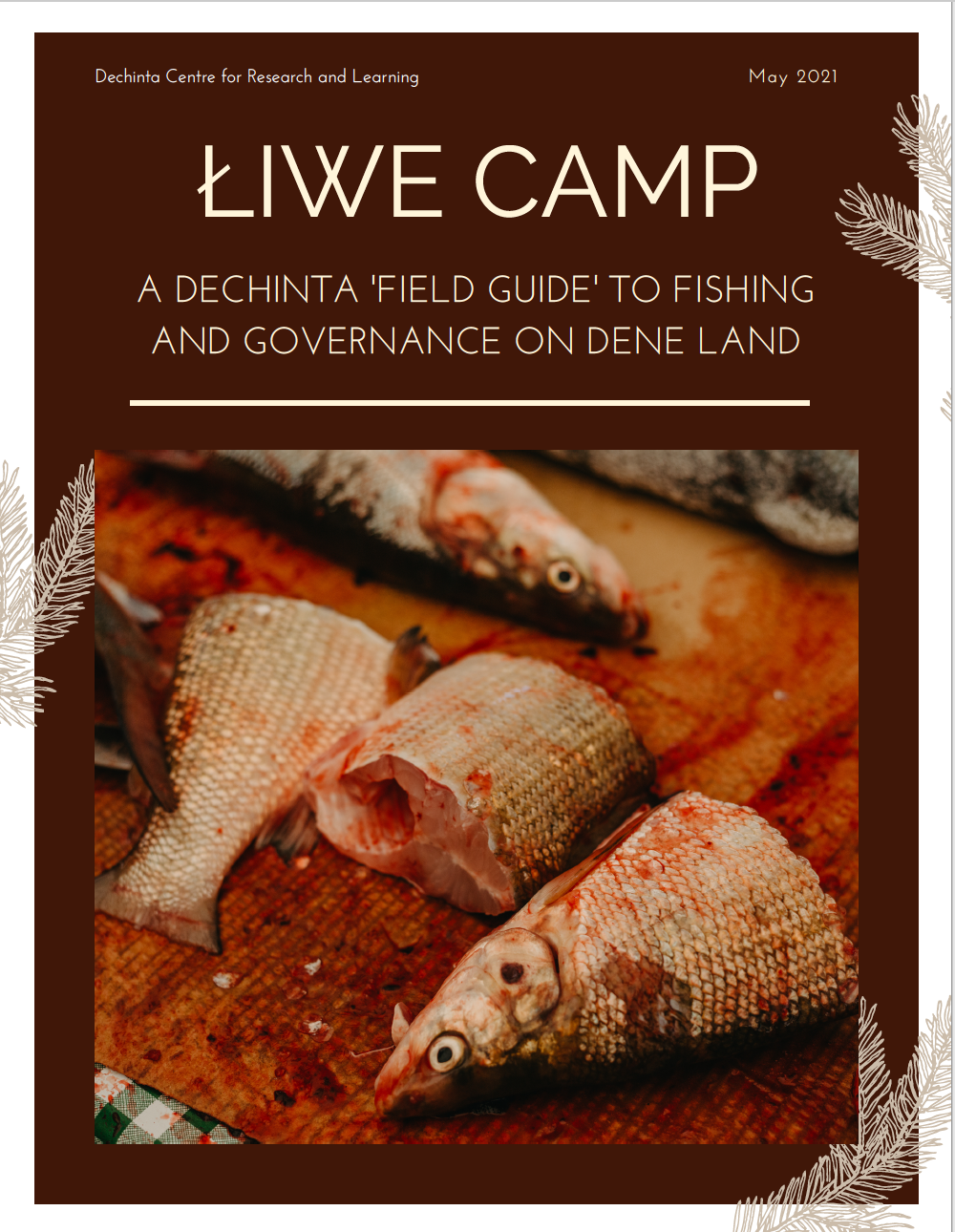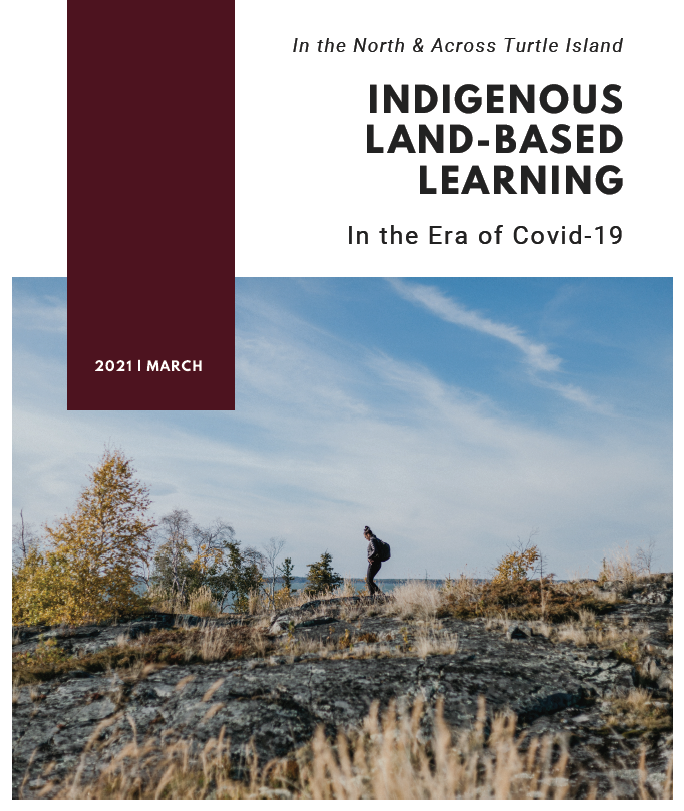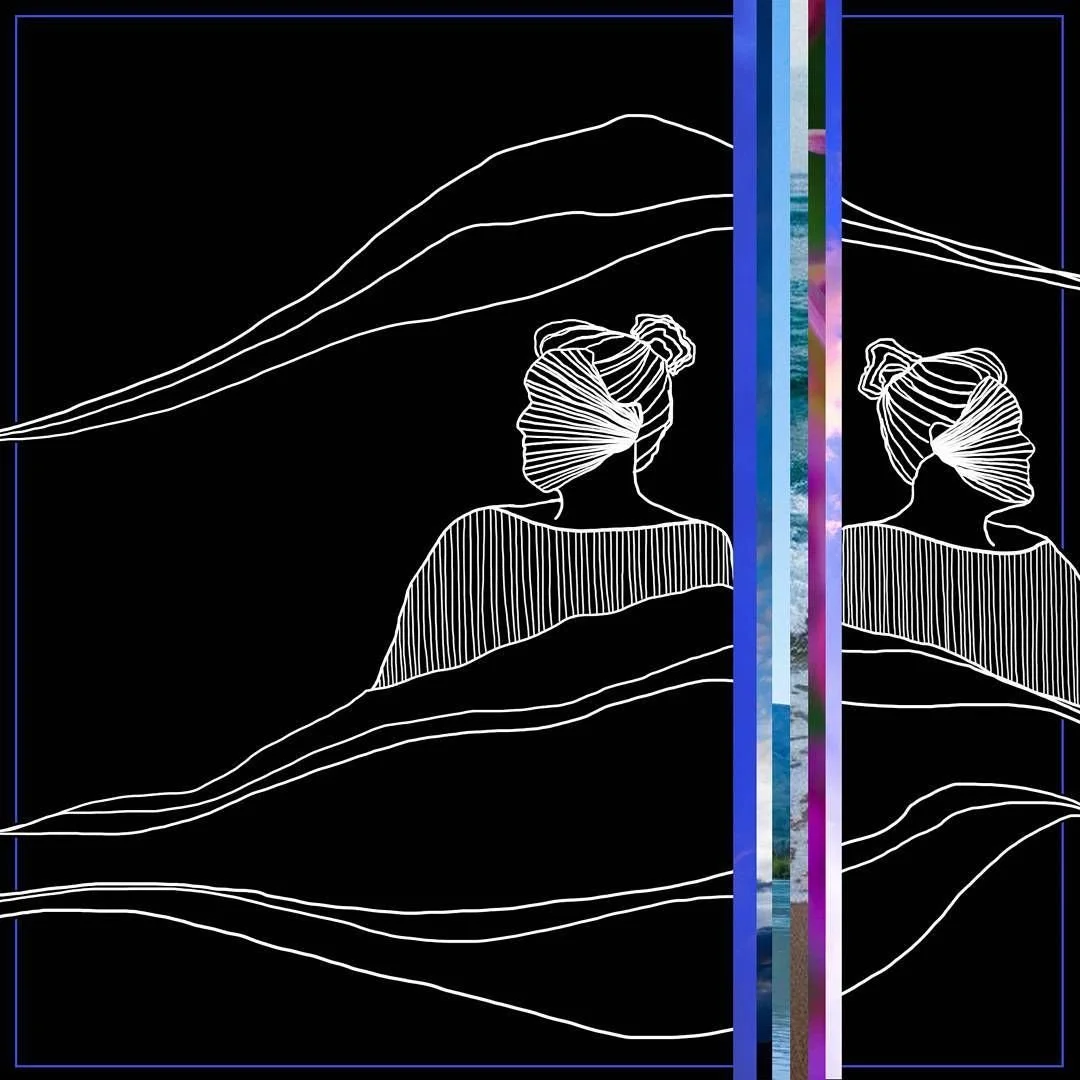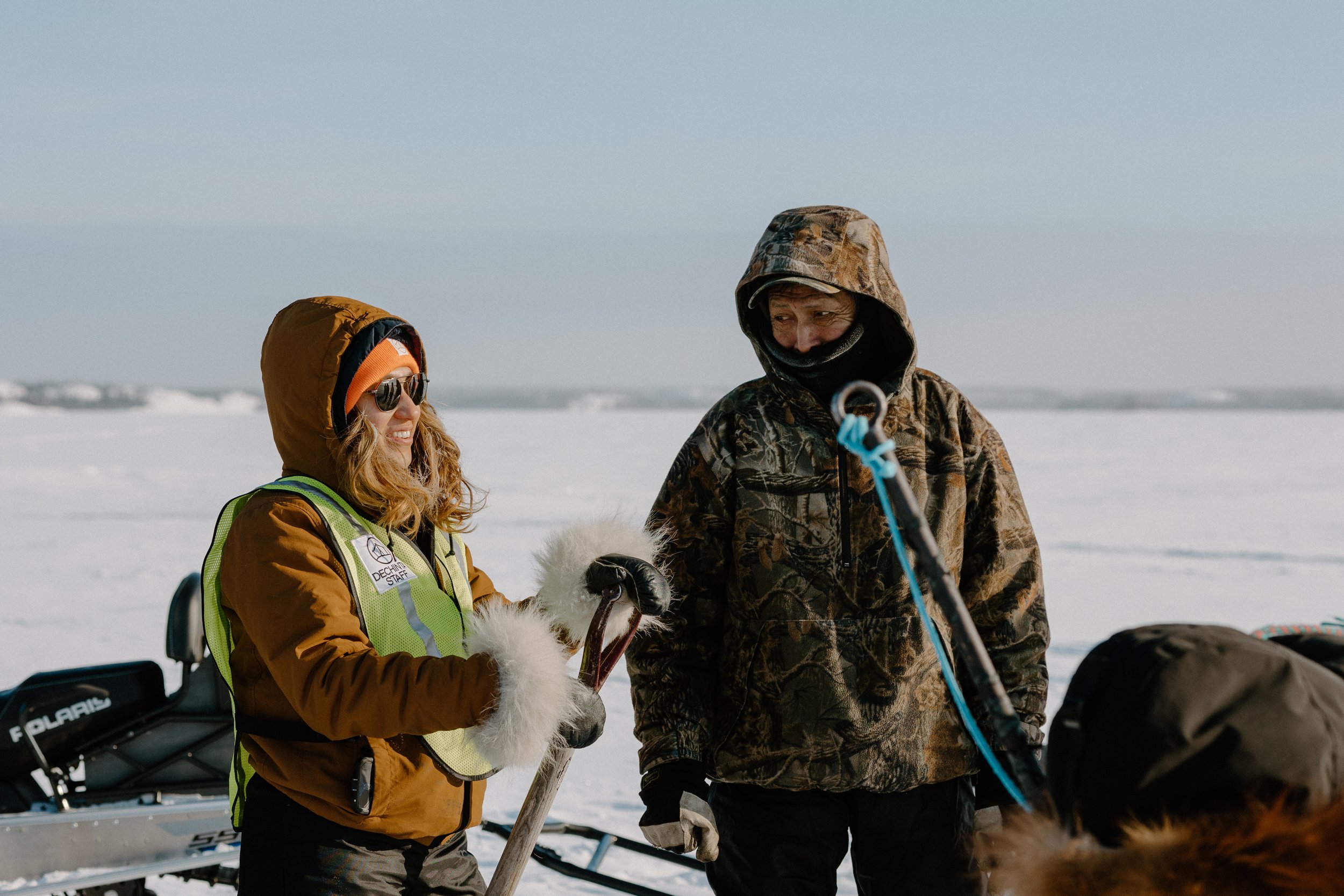
Videos and Resources
Gender and Queer Toolkit
In March of 2022, Sydney Krill created the Dechinta “Gender and Queer Terminology Toolkit,” a 55 page report that provides readers with a comprehensive overview of gender and queer history, terminology and resources, specifically in relation to Indigenous peoples. We have printed around 100 copies of the gender toolkit to distribute to students in our programs, to our professors and guest lecturers, to our staff members, and even to community members who asked for copies because they were interested in learning more about gender. We worked with 10 queer Indigenous and BIPOC artists to use their artwork in the toolkit.
Dechinta Impact Report
The past five years has been a time of incredible growth and expansion at theDechinta Centre for Research and Learning. After receiving multi-year federalfunding in 2019, Dechinta has grown our programming to span across severalregions in the North, developed multiple new community and accredited programsthat meet the evolving needs of the Indigenous communities we work with. Wehave trained and hired a diverse network of land-based practitioners from avariety of Northern Indigenous communities, carried out several large-scaleresearch projects designed to preserve and sustain Indigenous and in particular,Dene knowledge and culture, and have continued to expand and increase studentand community participation in all of our programs by adapting to the realities ofclimate change and the on-going COVID-19 pandemic.
The following report provides both qualitative and quantitative data from Dechintaprogramming, and draws from recent and relevant academic and publiclyavailable literature, policy documents, and program reports, to offer a snapshot ofthe significant impact Dechinta has had on students, staff, and communitymembers over the past three years. Download here.
Łiwe Camp Film and Report
“Dechinta Łiwe Camp: Fishing and governance on Dene Land” is a short film shot, edited, and produced by Dene filmmaker and Dechinta staff member Morgan Tsetta. The film premiered at the 2021 NAISA conference in July 2021, and was published online by Dechinta shortly after. The Łiwe Camp Short Film has had 2.5k views on Youtube since it was published. The film has been used as part of our curriculum for our post-secondary courses and was the feature film in a screening at McGill University. The film has been incredibly successful and has shown us that online spaces have an important place in knowledge dissemination and accessibility —there are thousands of people who now have a deeper understanding of Dene life, land, and the world of a Dene winter fish camp on Tı̨ndeè (Great Slave Lake), and are able to access this learning from their homes. Through this film we were able to see how sharing this knowledge, and making it accessible to others, expands the transformative potential of local Indigenous land-based activities such as Łiwe camp.
In addition to the creation of the film, Sydney Krill created a Łiwe Camp ‘field guide.’ This resource was originally created to add additional theory and context to the short film and to develop an additional learning resource for students and communities. The field guide aims to show readers how the Dene continue to govern themselves according to their own laws and resist the ongoing forces of colonialism in the North, to encourage readers to think critically about what it means to acknowledge Dene land in practice, and to learn about how a Dene land-based university operates on the ground. Since its release, we have used the ‘Łiwe Camp field guide’ as part of the curriculum for our post-secondary courses, and as a community resource to hand out to participants at our community events. Since it was published, we have distributed around 1000 copies of the field guide to Northern community members and students.
“We Have our Footsteps Everywhere” Video and Article
We Have Our Footsteps Everywhere is an ongoing research project led by Dechinta staff Josh Barichello and Lianne Marie Leda Charlie. It has involved interviews and research with Amos Dick, Norman Sterriah, Dorothy Smith and Mary Maje from the Ross River Dena Elder's Council, who explain why they did not sign a land claim and why they won't sell the land, in the Dena way. This research was published by Lianne and Josh as an article with Briarpatch in January 2022 and was the winner of Briarpatch’s 2021 Northern Writing Prize. In 2022 it was turned into a short film.
Public Speaker Series
Dechinta hosted three different speaker series events in 2021 and 2022. The first two were virtual speaker series events that were initially created as a way to continue doing research, knowledge dissemination, and create safe learning spaces during COVID-19. We were also able to host an in-person multi-event speaker series in Whitehorse.
Dechinta Covid-19 Webinar Series: This project was created in response to the urgent needs of Indigenous communities in the North during the COVID-19 pandemic. Led by Leanne Simpson and Alex Wilson, Dechinta hosted a series of webinars in the summer of 2020, and the videos and a subsequent report written by Sydney were released in the spring of 2021. Through the webinars, interviews, and curated lesson plans included in this report, we hoped to get students and educators to think critically and creatively about carrying out land-based education remotely during the COVID-19 pandemic and offer tools and resources to Indigenous land-based educators. We created 7 online webinars, posted to our website and YouTube channel. We had 21 Elders, academics, land-based educators, practitioners, and Indigenous Knowledge Holders from different nations across Canada participate in this webinar series. WATCH THE WEBINARS AND READ THE REPORT HERE.
Ts'eko Nàgeètso Virtual Speaker Series: As we continued to navigate COVID-19 into the winter of 2021, Dechinta created a 7-month long speaker series in order to create spaces of learning, knowledge creation and dissemination by Northern women activists and scholars. Hosted by Leanne Betasamosake Simpson, the Ts'eko Nàgeètso speaker series featured the brilliant voices of 8 Northern Indigenous women, each presenting on their personal experiences and academic work. The speakers included Mandee McDonald, Dr. Lianne Marie Leda Charlie, Dr. Crystal Gail Fraser, Siku Allooloo, Dr. Jamaica Heolimeleikalani Osorio, Tiffany Ayalik, Dr. Anita Lafferty, and Dahti Tsetso. We had approximately 260 participants attend our speaker series live on zoom, and to date, the speaker series videos have had 912 views on our YouTube Channel. As well, many of the videos are now being used as part of the curriculum for our post-secondary courses. WATCH THE WEBINARS HERE.
I Hold the Dehcho in My Heart -
Sedze Tah Dehcho E'Toh
This video was available through CBC but has recently been made private on their account.
In the summer of 2017, a group of Indigenous students and elders embarked on a six-week paddle trip down Canada’s longest river, in an effort to reconnect with Dene land and culture. “I Hold the Dehcho in my Heart / Sedze Tah Dehcho E’toh” focuses on the experience of two young Dene women, Kristen and Jiah, as they confront the physical and mental challenges of this rigorous excursion in the remote wilderness, while learning land-based skills from Dene elders.
The trip is part of a semester with the Dechinta Bush University, a university-accredited program that combines academia with land-based learning and teachings from elders, language instructors, and northern leaders. A growing number of programs are supporting land-based learning practices. Although several communities exist at the water’s edge, getting access to traditional territories via river travel has become difficult for the majority of Dene youth. Many of the trip’s elders were born and raised along the river, and have a considerable wealth of cultural knowledge and leadership experience, despite being forcefully removed from their families as children to attend residential schools. The students are on a mission to learn from these elders, to repair their generation’s severed connection with the land, and reclaim their identity.
Madeline Whetung: NAISA 2018 Presentation
Madeline Whetting made this video during her time on site in the 2018 spring semester where she had the role as a land-based team leader. This video was originally produced as a response to Leanne Simpson's 2018 book As We Have Always Done and was informed by Madeline's learnings on the land alongside Dechinta students. The video was first screened during a panel at the 2018 NAISA conference in LA, California.
Video edited by Morgan Tsetta.
Nahe Náhodhe Video Project
Dechinta hosted three different speaker series events in 2021 and 2022. The first two were virtual speaker series events that were initially To promote Dene Zhatie in the Dehcho region, Dehcho First Nations, in collaboration with partners and local communities, undertook this video and booklet project, Titled “Nahenáhodhe” – Our way of life, to share Dehcho Dene language, culture and knowledge of the land.
From October 1 to October 7th 2019, twenty-four participants including elders, fluent language speakers, youth and staff members gathered at the Kátł’odeeche Dene Wellness Center. Videographers documented the knowledge shared during the week and produced six short videos. Those videos will be made into six booklets in Dene Zhatie about Moose Hide, Spruce Trees, Dene Laws, Camp Setup, and Plant wisdom. The booklets will be made available for download online and then distributed in Dehcho Communities.
Land Based Education in Denendeh: Interview with Dr. Glen Coulthard
In this video, Dr. Glen Coulthard discusses the importance of land-based education in relation to decolonization and resurgence. Dr. Coulthard is Yellowknives Dene and an associate professor in the First Nations and Indigenous Studies Program and the Departments of Political Science at the University of British Columbia. He also teaches through Dechinta Centre for Research and Learning. This video was filmed in the MacKenzie Mountains in a place known as Ká Te, in the Northwest Territories.

